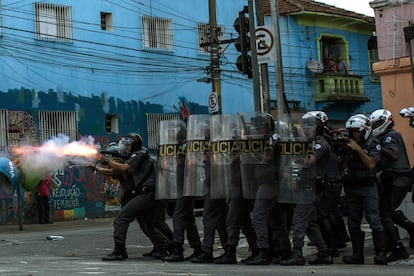São Paulo police operation after drug-linked killing of agent leaves at least eight dead
The police ombudsman has opened an investigation after 600 officers were deployed in a favela following the fatal shooting. Witnesses reported abuses including alleged torture

The massacres that periodically stain the Brazilian news with blood appeared once again over the weekend. In Guarujá, a coastal city in the state of São Paulo, a military police operation left at least eight people dead. The operation was mounted following the murder of a police officer and there are indications that the deaths were retaliatory. The police ombudsman places the number of people killed at 10 and has ordered an in-depth investigation after receiving reports of alleged torture.
On Thursday, July 27, policeman Patrick Bastos Reis, 30, was killed by a shot fired from the top of the favela where he was patrolling. According to official information, the perpetrator was an elite marksman who worked for a drug-trafficking organization. The suspect was arrested on Sunday in São Paulo but before he was apprehended the police launched a macro-operation in Guarujá to search for the gang suspected of attacking the officers. A total of 600 agents were deployed in a vast operation that specialists consider unusual in such cases. The so-called Operation Shield was orchestrated amid a climate of anger and thirst for revenge. In WhatsApp groups and on social networks, police officers with thousands of followers shared messages praising the operation. As the number of victims grew, they announced the count on Instagram stories. “Balance in Guarujá: information that six little angels are already in eternal sleep,” read a post by Military Police officer Diogo Ranieiri, whose account has 30,000 followers and promises to deliver “the best police content.”
The police ombudsman, Claudio Aparecido da Silva, reported up to 10 deaths based on accounts from residents. Da Silva also cited witness accounts of abuses ranging from the torture of detainees to house raids without a warrant, which is illegal but also common practice when the Brazilian police enter the favelas. The ombudsman stated that he will request access to the images from the body cameras that agents carry. The Prosecutor’s Office has also announced that it will open an investigation. Body cameras were implemented in São Paulo in 2020 and have helped to reduce the number of police-related deaths.
The Brazilian police forces are among the deadliest in the world. According to the recently published Public Security Yearbook, officers killed 6,430 people last year, an average of 17 a day. In the State of São Paulo, police lethality was reduced by half over two years, something that specialists attribute to body cameras. The state governor, the right-wing Tarcísio de Freitas, had previously announced that he would rescind the requirement to wear cameras but eventually backed down.
On Monday, De Freitas closed ranks with the police. “I am extremely satisfied with the action of the police, and extremely sad with what happened because nothing will bring back a father of a family,” he said during a press conference. The São Paulo governor is the current frontrunner to succeed former president Jair Bolsonaro, who has been barred from running in the 2026 presidential elections. However, he has made some political moves that have failed to enchant his more conservative voters. The state government he has formed is not as radical as some would like and he recently backed President Lula da Silva’s Economy Minister Fernando Haddad over tax reform. The most radical Bolsonaro supporters have not forgiven that detour from the party line. By sticking out his chest and allying himself unambiguously with the police, De Freitas is seeking a reconnection with a section of the electorate from which he had recently distanced himself.
Sign up for our weekly newsletter to get more English-language news coverage from EL PAÍS USA Edition
Tu suscripción se está usando en otro dispositivo
¿Quieres añadir otro usuario a tu suscripción?
Si continúas leyendo en este dispositivo, no se podrá leer en el otro.
FlechaTu suscripción se está usando en otro dispositivo y solo puedes acceder a EL PAÍS desde un dispositivo a la vez.
Si quieres compartir tu cuenta, cambia tu suscripción a la modalidad Premium, así podrás añadir otro usuario. Cada uno accederá con su propia cuenta de email, lo que os permitirá personalizar vuestra experiencia en EL PAÍS.
¿Tienes una suscripción de empresa? Accede aquí para contratar más cuentas.
En el caso de no saber quién está usando tu cuenta, te recomendamos cambiar tu contraseña aquí.
Si decides continuar compartiendo tu cuenta, este mensaje se mostrará en tu dispositivo y en el de la otra persona que está usando tu cuenta de forma indefinida, afectando a tu experiencia de lectura. Puedes consultar aquí los términos y condiciones de la suscripción digital.








































